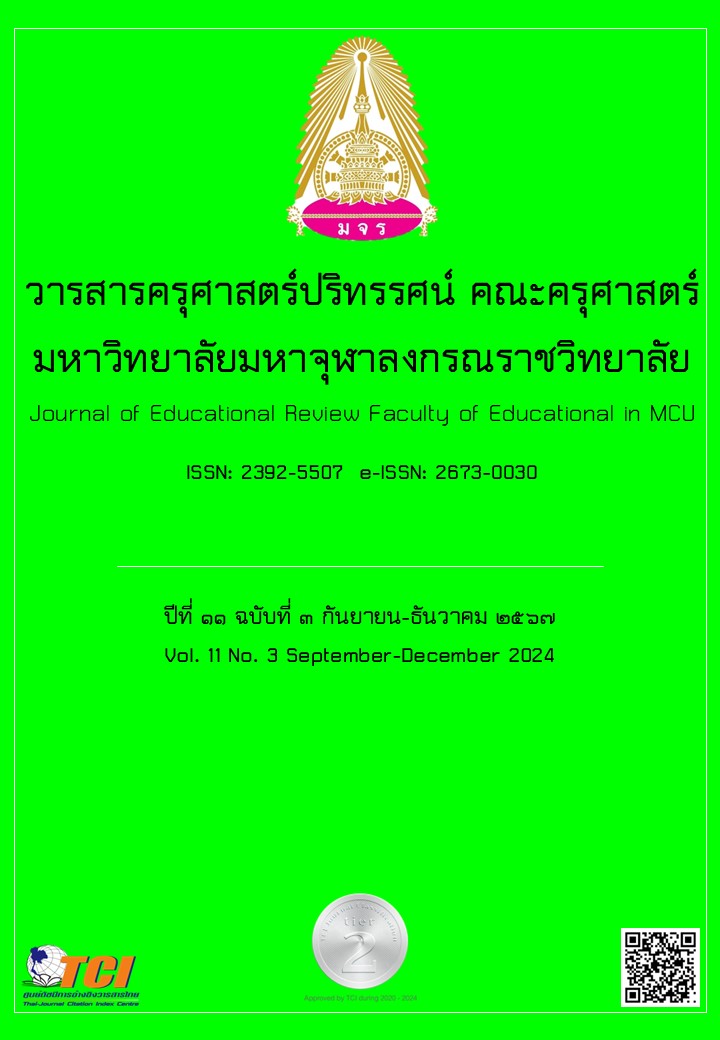MODEL OF ACADEMIC LEADERSHIP IN THE DIGITAL AGE OF BASIC SCHOOL ADMINISTRATORS IN NAKHON SAWAN PROVINCE ACCORDING TO IDDHIPA ̅DA IV
Main Article Content
Abstract
This research aims to 1) analyze the components of academic leadership in the digital age of educational administrators, 2) create a model of academic leadership in the digital age of educational administrators based on the Four Iddhip da (Bases of accomplishment), and 3) evaluate the model of academic leadership in the digital age of educational administrators based on the Four Iddhip da (Bases of accomplishment). This research is a mixed-method research, both qualitative and quantitative research, with 3 research steps: Step 1: Analyzing the components of academic leadership in the digital age of educational administrators by interviewing 18 key informants, using content analysis, using a questionnaire with a sample of 434 people based on Hair's concept, analyzing data from the questionnaires using descriptive statistics, including frequency, percentage, mean, and standard deviation, to find the level of academic leadership in the digital age of educational administrators, and analyzing the components using Exploratory Factor Analysis (EFA). Step 2: Creating a model, an expert seminar with 9 qualified persons, analyzing data using content analysis, analyzing data on the appropriateness of the model guide using statistics, arithmetic mean, and standard deviation. Step 3: Evaluating the model, the evaluation form was applied to 30 administrators and academic teachers. Data were analyzed using statistics, including arithmetic mean and standard deviation. The research results found that 1) The components of academic leadership in the digital age of administrators were overall at a moderate level. It consisted of 5 components: Component 1: Vision and goals in the digital age, with 47 important variables; Component 2: Learning persons in the digital age, with 15 important variables; Component 3: Building academic collaboration networks in the digital age, with 5 important variables; Component 4: Creating technological innovation in the digital age, with 5 important variables; and Component 5: Academic friends in the digital age, with 5 important variables. 2) The model of academic leadership in the digital age of basic education administrators in Nakhon Sawan Province according to the principle of the Four Iddhip da consisting of 3 parts: Part 1: Introduction, concept and theory, objectives and formats; Part 2: Content and guidelines for implementation, with 5 components; Part 3: Conditions for success; and 3) The results of the evaluation of academic leadership models in the digital age of basic education administrators in Nakhon Sawan Province according to the principle of the Four Iddhip da, all four aspects were included at a high level: correctness, appropriateness, usefulness, and possibility.
Article Details

This work is licensed under a Creative Commons Attribution-NonCommercial-NoDerivatives 4.0 International License.
ทัศนะและความคิดเห็นที่ปรากฏในบทความในวารสารฉบับนี้ถือเป็นความรับผิดชอบของผู้เขียนบทความนั้นเพียงผู้เดียว และไม่ถือเป็นทัศนะและความรับผิดชอบของกองบรรณาธิการ
กองบรรณาธิการขอสงวนสิทธิ์ในการคัดเลือกบทความลงตีพิมพ์และจะแจ้งให้เจ้าของบทความทราบหลังจากผู้ประเมินบทความตรวจอ่านบทความแล้ว
ต้นฉบับที่ได้รับการตีพิมพ์ในวารสารครุศาสตร์ปริทรรศน์ คณะครุศาสตร์ มหาวิทยาลัยมหาจุฬาลงกรณราชวิทยาลัย ถือเป็นกรรมสิทธิ์ของคณะครุศาสตร์ มหาวิทยาลัยมหาจุฬาลงกรณราชวิทยาลัย ห้ามนำข้อความทั้งหมดหรือบางส่วนไปพิมพ์ซ้ำ เว้นเสียแต่ว่าจะได้รับอนุญาตจากมหาวิทยาลัยฯ เป็นลายลักษณ์อักษร
References
กนกอร สมปราชญ์. (2562). ภาวะผู้นำ: แนวคิด ทฤษฎีและการพัฒนา. ขอนแก่น: คณะศึกษาศาสตร์ มหาวิทยาลัยขอนแก่น.
กระทรวงศึกษาธิการ. (2564). สภาวะการศึกษาไทย ปี 2564. กรุงเทพมหานคร: สำนักงานเลขาธิการสภาพการศึกษา.
กัลยา ติงศภัทิย์. (2557). ความท้าทาย ณ ขอบแดนใหม่แห่งการเรียนรู้: การศึกษาระบบ 4.0. ในการสัมมนาทางวิชาการ จัดสัมมนาโดยศูนย์นวัตกรรมการเรียนรู้จุฬาลงกรณ์มหาวิทยาลัย.
จิณณวัตร ปะโคทัง. (2551). ภาวะผู้นำยุคดิจิทัล ของผู้บริหารสถานศึกษามืออาชีพ. อุบลราชธานี: คณะครุศาสตร์ มหาวิทยาลัยราชภัฏอุบลราชธานี.
จิติมา วรรณศรี. (2553). ภาวะผู้นำทางวิชาการของผู้บริหารสถานศึกษา. Journal of Education and Innovation. 12(1). 35–49.
ชัยยนต์ เพาพาน. (2559). แนวคิดและทฤษฎีพื้นฐานการเป็นผู้นำของผู้บริหารสถานศึกษาในศตวรรษที่ 21. วารสารบริหารการศึกษา มหาวิทยาลัยขอนแก่น. 12(1). 1-9.
ทิพวรรณ โพธิ์ขำ. (2563). รูปแบบการบริหารโรงเรียนประชารัฐในยุคดิจิทัล สังกัดสำนักงานคณะกรรมการการศึกษาขั้นพื้นฐาน. ดุษฎีนิพนธ์ครุศาสตรดุษฎีบัณฑิต. มหาวิทยาลัยราชภัฏนครสวรรค์.
ทิศนา แขมมณี. (2547). ศาสตร์การสอน: องค์ความรู้เพื่อการจัดกระบวนการเรียนรู้ที่มีประสิทธิภาพ. พิมพ์ครั้งที่ 7. กรุงเทพมหานคร: สำนักพิมพ์แห่งจุฬาลงกรณ์มหาวิทยาลัย.
พระพรหมคุณาภรณ์ (ป. อ. ปยุตฺโต). (2554). พจนานุกรมพุทธศาสน์ฉบับบประมวลศัพท์. กรุงเทพมหานคร: โรงพิมพ์พระพุทธศาสนาของธรรมสภา.
พิชญ์ชญา มีแก้ว. (2564). รูปแบบการพัฒนาภาวะผู้นำทางวิชาการของครูในยุคดิจิทัลโรงเรียนมัธยมศึกษาขนาดเล็ก สังกัดสำนักงานคณะกรรมการการศึกษาขั้นพื้นฐาน. ดุษฎีนิพนธ์การศึกษาดุษฎีบัณฑิต. มหาวิทยาลัยราชภัฏอุบลราชธานี.
ศศิศ ศิริพรหมมา. (2560). การพัฒนารูปแบบภาวะผู้นำทางวิชาการของผู้บริหารสถานศึกษาในสังกัดสำนักงานเขตพื้นที่การศึกษาประถมศึกษาชัยภูมิ เขต 1. ดุษฎีนิพนธ์ครุศาสตรดุษฎีบัณฑิต. มหาวิทยาลัยราชภัฎบ้านสมเด็จเจ้าพระยา
สมหมาย อ่ำดอนกลอย. (2556). บทบาทผู้บริหารสถานศึกษาในศตวรรษที่ 21. วารสารบัณฑิตศึกษา มหาวิทยาลัยราชภัฏพิบูลสงคราม. 7(1). 1-7.
สำนักงานปลัดกระทรวงศึกษาธิการ. (2564). แผนปฏิบัติราชการประจำปีงบประมาณ 2564 ของสำนักงานปลัดกระทรวงศึกษาธิการ. กรุงเทพมหานคร: สำนักนโยบายและยุทธศาสตร์.
สำนักงานศึกษาธิการจังหวัดนครสวรรค์. (2565). รายงานข้อมูลสารสนเทศทางการศึกษาของสำนักงานศึกษาธิการจังหวัดนครสวรรค์ ปีการศึกษา 2565. นครสวรรค์: ริมปิง.
สุกัญญา แช่มช้อย. (2562). การบริหารสถานศึกษาในยุคดิจิทัล. กรุงเทพมหานคร: สำนักพิมพ์แห่งจุฬาลงกรณ์มหาวิทยาลัย.
สุรีรัตน์ โตเขียว. (2560). รูปแบบภาวะผู้นำของผู้บริหารสถานศึกษาขั้นพื้นฐานในศตวรรษที่ 21. ดุษฎีนิพนธ์ครุศาสตรดุษฎีบัณฑิต. มหาวิทยาลัยราชภัฎนครสวรรค์.
Anan Navee, P. (2009). Principles and concepts Educational Administration Theory. 2nd ed. Bangkok: Montree.
Issararak, A. (2005). Relationship between leadership and school effectiveness. Master of Education Thesis. Burapha University. Bangkok.
Roon Charoen. (2012). Professionalism in educational organization and administration in the educational reform era. 7th ed. Bangkok: LT Place Co.Ltd.
Wannasri, J. (2010). Academic leadership of school administrators. Journal of Education. 12(1). 35-49.


